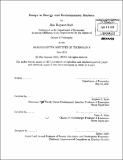| dc.contributor.advisor | Stephen P. Ryan and Nancy L. Rose. | en_US |
| dc.contributor.author | Reguant-Rido, Mar | en_US |
| dc.contributor.other | Massachusetts Institute of Technology. Dept. of Economics. | en_US |
| dc.date.accessioned | 2011-08-30T15:41:50Z | |
| dc.date.available | 2011-08-30T15:41:50Z | |
| dc.date.copyright | 2011 | en_US |
| dc.date.issued | 2011 | en_US |
| dc.identifier.uri | http://hdl.handle.net/1721.1/65492 | |
| dc.description | Thesis (Ph. D.)--Massachusetts Institute of Technology, Dept. of Economics, 2011. | en_US |
| dc.description | Cataloged from PDF version of thesis. | en_US |
| dc.description | Includes bibliographical references (p. 145-150). | en_US |
| dc.description.abstract | In this thesis, I explore issues related to energy and environmental markets. In the first chapter, I examine the benefits of complementary bidding mechanisms used in electricity auctions. I develop a model of complex bidding and estimate its structural parameters in the context of the Spanish electricity market. I then perform a counterfactual analysis in which the original mechanism is compared to one in which complex bids are not allowed. I find that, while firms do exercise market power through complex bids, the positive coordination benefits of complex bidding dominate. In the second chapter, I explore the impacts of cap-and-trade in the Spanish electricity market, quantifying the rate at which firms internalized the costs of the emissions as well as the rate at which they passed it through. I find evidence that supports a full internalization rate at the firm-level, which results in a partial pass-through due to both demand and supply factors. Finally, in chapter 3, in joint work with Meredith Fowlie and Stephen Ryan, we explore the long run dynamic implications of subjecting an imperfectly competitive industry to market-based pollution regulation. Using two decades of panel data on the US Portland cement industry, we estimate a fully dynamic model of firms' strategic entry, exit, production, and investment decisions. We then use the model to simulate counterfactual outcomes under three general classes of allocation regimes: auctioning, grandfathering, and contingent updating. We find that the imposition of a carbon trading program would lead to large social losses at low to medium carbon prices. | en_US |
| dc.description.statementofresponsibility | by Mar Reguant Ridó. | en_US |
| dc.format.extent | 150 p. | en_US |
| dc.language.iso | eng | en_US |
| dc.publisher | Massachusetts Institute of Technology | en_US |
| dc.rights | M.I.T. theses are protected by
copyright. They may be viewed from this source for any purpose, but
reproduction or distribution in any format is prohibited without written
permission. See provided URL for inquiries about permission. | en_US |
| dc.rights.uri | http://dspace.mit.edu/handle/1721.1/7582 | en_US |
| dc.subject | Economics. | en_US |
| dc.title | Essays in energy and environmental markets | en_US |
| dc.type | Thesis | en_US |
| dc.description.degree | Ph.D. | en_US |
| dc.contributor.department | Massachusetts Institute of Technology. Department of Economics | |
| dc.identifier.oclc | 746654459 | en_US |
